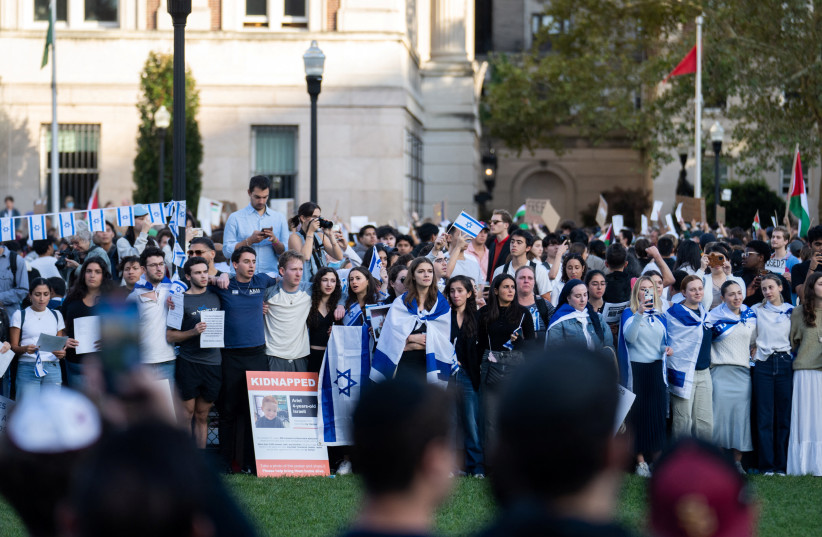The letter comes following an incident on Wednesday night, when an Israeli student was assaulted outside the main campus library of Columbia University in New York City, according to police.
“A lot of Jewish students are really struggling when they see their peers or their classmates celebrating, not just condoning, but celebrating what’s happening as a form of resistance,” said Julia Jassey, a recent college graduate and the CEO of Jewish on Campus, an advocacy group for Jewish and Zionist students. “It’s a really impossible moment, a really impossible thing to grapple with and university administrations have an obligation to stand in support with Jewish college students.”
SJP, which has a national umbrella group and campus chapters across the country, has spoken out in support of Hamas’ invasion of Israel.
Close to 30 Jewish organizations including the American Jewish Committee, Democratic Majority for Israel, and the Israel on Campus Coalition signed the letter. The nearly 200 other signatories included Jewish and non-Jewish student groups, local Jewish community organizations and state lawmakers from around the country.
Statements signed by coalitions at some schools have blamed Israel entirely for the massacre of its own citizens. Video of a protest on Tuesday at the University of Wisconsin-Madison showed a call-and-response chant with a group of pro-Palestinian protesters, including children, that called to “liberate the land by any means necessary.”

Palestinian violence towards Jewish students
In the Columbia University attack, a 19-year-old woman had struck a 24-year-old man with a wooden stick, police told the Jewish Telegraphic Agency. The alleged assailant was arrested and charged with assault. The Columbia Spectator, the campus newspaper, quoted another Israel student on the scene who said that the suspect attacked the man after she ripped down posters he had put up about hostages in Gaza, and he confronted her.
“Our community woke this morning to the terrible news that an Israeli student was assaulted outside of Butler Library last night,” read a statement by the school’s Hillel. “To be clear: we condemn any violence against any student on campus, and we especially condemn the antisemitic targeting of Israelis or Jewish students at this time.”
The following day, which SJP declared a “National Day of Resistance,” the Hillel said it locked down its building, with students inside, as an SJP rally passed nearby.
“These actions and statements cannot be ignored and must be condemned — by all members of the university community,” the organizations’ letter said, highlighting concern about the safety and well-being of Jewish and Israeli students.
A separate letter from leading Jewish groups including the Anti-Defamation League, American Jewish Committee, Conference of Presidents and Hillel International was sent to over 500 university presidents, demanding action to protect Jewish students.
The letter was organized by the Louis D. Brandeis Center for Human Rights Under Law, a legal group that advocates and files complaints on behalf of Jewish and pro-Israel students. Many of its cases center on criticism of Israel that it says veers into antisemitism.
The signatories called on schools to implement security measures for Jewish students; denounce the Hamas attack and rhetoric supporting it; pull any administration sponsorship from events backing the Hamas attack on Israelis, and hold educational initiatives on antisemitism.
“University leaders often have less courage in addressing antisemitism than other forms of discrimination. When other groups are hurting, university leaders feel they can respond without courting controversy,” the chairman of the Brandeis Center, Kenneth Marcus, told the New York Jewish Week. “But the Jewish community is both internally divided and also opposed by some other groups, which makes it more difficult for university leaders to respond as forcefully as they should.”
The Brandeis Center says some students have reported leaving their campuses due to fears for their safety. Marcus said that his group may pursue legal action against universities, which are legally required to ensure students’s safety. He said SJP may also be criminally liable for supporting Hamas, a designated foreign terrorist organization. While anti-terror laws do not prohibit ordinary speech in favor of a particular policy agenda, if a group is helping a terror organization achieve its public relations goals with potential impact on public policy, it could be a criminal offense, Marcus said.
Some university presidents have issued forceful condemnations of the Hamas attack, while others have faced criticism for vague statements, remaining silent or publicly refusing to comment. The free-speech advocacy group Foundation For Individual Rights and Expression urged universities to “maintain institutional neutrality” in an essay published Thursday, without naming Hamas or Israel specifically.
